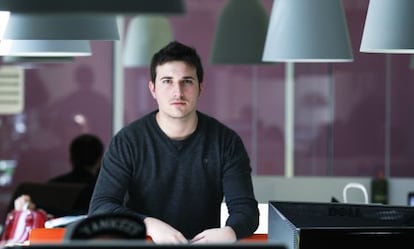Fever: The app that maps out Madrid and New York nightlife
Spanish programmer Pep Gómez has created an application that plans your nights out

Pep Gómez Torres was just 14 when he set up Redondea, a website to help bands organize their tours. Before that he was already designing web pages for friends and companies, using the money he earned to buy his first Apple Mac. His parents were supportive: “As long as I kept up my grades, and I never got less than a seven out of 10,” he explains.
The 24-year-old says that he inherited his business sense from his family, which started out selling tiles, and eventually moved into rural tourism. After setting up the Generation Net blog network, in the summer of 2010 he decided to try his luck in San Francisco.
It was there that he came up with the idea for Fever, an application that has secured financial backing from production company Red One, as well as Voice Over Internet pioneer Jeff Pulver. He then hired the same law firm that represents Facebook, which doesn’t charge its clients until they secure their first round of capital investment.
The application has attracted 45,000 active users per month, and has been present at over 30,000 events
A year later, he won a competition organized by the former mayor of New York, Michael Bloomberg. The first prize of $1 million comes with a mentor and a Manhattan office. The application has so far attracted 45,000 active users per month, and has been present at more than 30,000 events.
“Fever is a reply to the question, What should I do? It doesn’t provide you with 3,000 plans, but simply comes up with the best one for you,” Gómez explains. “When somebody wants to go to a concert, let’s say, a Bruno Mars gig, they have to go through various steps: you find out about it on TV or Twitter, then you look on the internet, and then you print out the tickets from your computer. On Fever, which is designed for smartphones, you buy your tickets in two steps, and you can use it to see if your Facebook friends are going. We are basically the point where social networks meet entertainment and content.”
The idea was born in San Francisco, where Gómez created a way of listing the places people were going using Foursquare, as well as localized tweets. “I noticed that there were entire areas of the map that were red, like a fever,” he says.
We are basically the point where social networks meet entertainment and content”
The application can be linked to a user’s Facebook page, and is soon set to be linked to Twitter. “We are looking for local experts. When somebody signs up they choose three categories that interest them. The more they use it the more useful it becomes, and it can be used for special events,” he explains. Madrid and New York are so far the only cities where the application is working. “The important thing is to generate activity and critical mass. We will add more cities later on. Just like Airbnb, Uber and HotelTonight. The idea is to start local and then to spread into the rest of Europe and the United States.”
Gómez says that he’s not worried that the idea will be copied: “Competition is healthy, but the idea is to be fast and really take care over the design. Airbnb has shown that not only will people pay for a service, but also to be part of it. People use it to see photographs of the interiors of other homes. Good presentation improves the throughput rate.”
He insists that the idea has nothing to do with deal-of-the-day site Groupon: “There is no need to print anything here, just show your smartphone. It’s also great for getting into clubs without waiting in line. We also have great data analysis, so we know how long you spend at a particular place. This helps us with personalizing recommendations.”
It’s great for getting into clubs without having to wait”
Fever makes its money by charging event organizers a commission. It receives payment from free events for helping to publicize them. The service only works on smartphones. “The applications that are really successful are those that solve a real problem, services that we use without thinking about, like WhatsApp,” says Gómez. “We want to be the place to make plans by phone. Computers don’t make sense anymore.”
Tu suscripción se está usando en otro dispositivo
¿Quieres añadir otro usuario a tu suscripción?
Si continúas leyendo en este dispositivo, no se podrá leer en el otro.
FlechaTu suscripción se está usando en otro dispositivo y solo puedes acceder a EL PAÍS desde un dispositivo a la vez.
Si quieres compartir tu cuenta, cambia tu suscripción a la modalidad Premium, así podrás añadir otro usuario. Cada uno accederá con su propia cuenta de email, lo que os permitirá personalizar vuestra experiencia en EL PAÍS.
¿Tienes una suscripción de empresa? Accede aquí para contratar más cuentas.
En el caso de no saber quién está usando tu cuenta, te recomendamos cambiar tu contraseña aquí.
Si decides continuar compartiendo tu cuenta, este mensaje se mostrará en tu dispositivo y en el de la otra persona que está usando tu cuenta de forma indefinida, afectando a tu experiencia de lectura. Puedes consultar aquí los términos y condiciones de la suscripción digital.








































